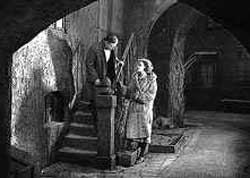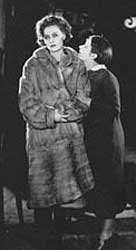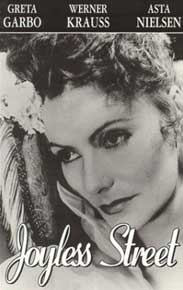 Gretta Garbo's second starring vehicle was the G. W. Papst silent film Joyless Street (1925). It's set in a time of food shortages, breadlines, & poverty for the average Viennese; a time when crooked stock manipulators lived on ill-gotten wealth while the masses were bankrupted.
Gretta Garbo's second starring vehicle was the G. W. Papst silent film Joyless Street (1925). It's set in a time of food shortages, breadlines, & poverty for the average Viennese; a time when crooked stock manipulators lived on ill-gotten wealth while the masses were bankrupted.
Greta waits all night in a food line only to be turned away at dawn, empty-handed, exhausted, but still having to make it to her office job. Through that same night, nearby at Madame Gill's, the wealthy & the Decadent of Vienna toast to their own beauty & fortune.
Garbo is not merely timelessly beautiful, but captivatingly expressive, the ideal silent film star. Pabst was a great filmmaker & the visual appeal of Joyless Street & atmospheric sets are easily as good as F. W. Murnau or D. W. Griffith. But apart from the sets & faces, it isn't that great. The story of ecnomic manipulation & ruin of the middle classes is not appealing.
The moral lessons go awry, too, when hunger is expressed in terms of plenty to eat unless you wanted meat, pitifully reduced to a perfectly fine vegetarian stew. Or poverty is equated with nice clothes to wear unless you wanted furs. Griffin or Murnau, unlike Pabst, would never have mistaken the desire for excess for poverty.
A parallel story is underdeveloped & given for brpad contrast. Another family in the same apartment building has been desparate for a much longer time. Marie (Asta Nielson) is sickly but it's up to her make whatever living can be made for the family, & she turns to prostitution. Marie is a pasty-faced caricature of a doomed woman, not a real character at all.
Oddly enough, Asta Nielson was the big star of the period whereas Garbo was a newcomer without her own following. It's odd that Asta was given such a poor role. But fact is, she was beyond her physical prime, & Garbo was being groomed as the next big thing.
 Greta's father's investments promised wealth & lazy living, but instead left him penniless, at the same time as Greta's lustful disgusting employer fires her for not putting out sexually. So she's afraid she'll have to return her new fur coat, woe betide the day. But the clothing store owner (Valeska Gert ) says Greta can pay for it on time, & she'll even arrange a new job for her, which alas will turn out to be at Madame Gill's.
Greta's father's investments promised wealth & lazy living, but instead left him penniless, at the same time as Greta's lustful disgusting employer fires her for not putting out sexually. So she's afraid she'll have to return her new fur coat, woe betide the day. But the clothing store owner (Valeska Gert ) says Greta can pay for it on time, & she'll even arrange a new job for her, which alas will turn out to be at Madame Gill's.
The lodger they had to take in is a wealthy good-natured American, handsome & generous. He & Greta fall in love, but her crabby father kicks him out for a very bad reason. When her father finds out she's taken a job at Madame Gill's, he breaks down & confesses to his own folly having laid the family so long.
At the last minute the American saves Greta from harlotry or at least being pawed by her first disgusting client (Werner Krauss). It's the lamest happy ever after possible.
Pabst's heart was in the right place in wanting to show how the burden of keeping families together during hard times fell primarily on the shoulders of women. He drew from personal knowledge of hardship in Vienna in the Depression that followed the first world war. But if this film echoes his own family's suffering, they didn't suffer much.
Joyless Street was supposed to be a film of great realism & grittiness about streetlife & poverty. But Pabst's great work was definitely still in his future. Even so, Joyless Street can be regarded as a transitional melodrama on Pabst's journey to becoming a mature filmmaker.
It's also worth seeing because Garbo is marvelous even in a weak tale, & her performance is excellent, if somewhat wasted in inadequate scenarios. For its day, of course, it was very daring merely to show prostitution, especially of such innocent women, so it was a groundbreaking film despite being misguided in the way it mistakes plenty to eat for hunger & difficulty paying for a fancy fur coat as a good enough reason to be tempted to prostitute oneself.
copyright © by Paghat the Ratgirl
|

